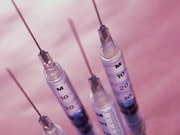Findings seen among people with dystonia or spasticity treated with botulinum toxin type A
TUESDAY, Dec. 11, 2018 (HealthDay News) — About 15 percent of patients treated with botulinum toxin type A (BoNT/A) for dystonia or spasticity can develop an immune response to the treatment itself, according to a study published online Nov. 21 in Neurology.
Philipp Albrecht, M.D., from the Heinrich Heine University Düsseldorf in Germany, and colleagues tested 596 outpatients treated with BoNT/A for different indications (facial hemispasm, blepharospasm, cervical dystonia, other dystonia, and spasticity) for BoNT/A binding antibodies using an enzyme-linked immunosorbent assay. Positive samples were assessed for neutralizing antibodies (NABs) using the mouse hemidiaphragm test.
The researchers found that 13.9 percent of patients had measurable NABs. There was an increased probability of developing NABs with the single and cumulative dose of treatment, and the probability was influenced by the BoNT/A formulation. Disease entity and treatment duration had no additional influence on NAB development.
“People may be able to lessen their chances of developing this response by making sure the dose of the drug in each injection is as low as possible, the time between injections is not shortened, and booster injections are avoided,” Albrecht said in a statement.
Merz Pharmaceuticals provided funding for the study.
Copyright © 2018 HealthDay. All rights reserved.








